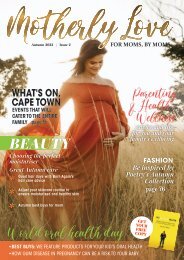Motherly Love Summer 2021
Motherly Love is a family lifestyle brand that is aimed to inform & inspire modern women through the journey of motherhood
Motherly Love is a family lifestyle brand that is aimed to inform & inspire modern women through the journey of motherhood
Create successful ePaper yourself
Turn your PDF publications into a flip-book with our unique Google optimized e-Paper software.
EDUCATION reading
Raising your child
to love reading is
one of the most
wonderful gifts
you can give them.
As Emma Cox said, “Reading is the
most powerful gift we can give a
child: it puts stardust in their
imaginations.”
While improving a child’s
imagination is one of the benefits of
reading to them from as early as the
day they’re born, there are also other
significant benefits to children
listening to stories which will help
them throughout their school careers
and beyond.
While more than half of parents
don’t read to their children before
the age of 3, according to research
from Nielsen 45% of 0 to 2-year-olds
are read to daily or nearly every day
increasing to 58% of 3- to 4-year olds.
By the time children reach 5 to 7
years, this figure drops to 44%—this
is the most important time to be
reading to children.
According to research on
children’s brain development, by 2
years old a child’s brain is as active
as an adult’s—and by age 3 it is more
than twice as active as an adult’s
brain. Further, as cognitive processes
develop rapidly in the first few years
of life, and by age 3 approximately
85% of the brain is developed. As
such, it’s never too early to start
reading to children and promote
early development.
SPEECH DEVELOPMENT
AND VOCABULARY
Exposing young children to stories is
the first step to helping develop their
speech. By listening to adults speak
and read, children are exposed to a
wide variety of sounds and words
that help them to develop their
speech. As children listen to stories,
their brains make cognitive
connections to how language is used,
and exposes them to words that are
often not used in spoken language.
This is supported by a study on
early language exposure (Journal of
the American Academy of Pediatrics),
which states there’s a definite
relationship between language
development and early exposure to
adult language, which positively
impacts children’s language ability
through primary school. The study
emphasises the importance of
interacting with children between
the ages of 18 and 24 months, which
is the period of a language explosion.
It states that reading aloud gives
children enriched vocabulary and
prompts enriched interactions.
COGNITIVE ABILITY
Cognitive ability refers to the way in
which we perceive our world and
experiences, and is the ability to
38
Motherly LOVE Issue 1




